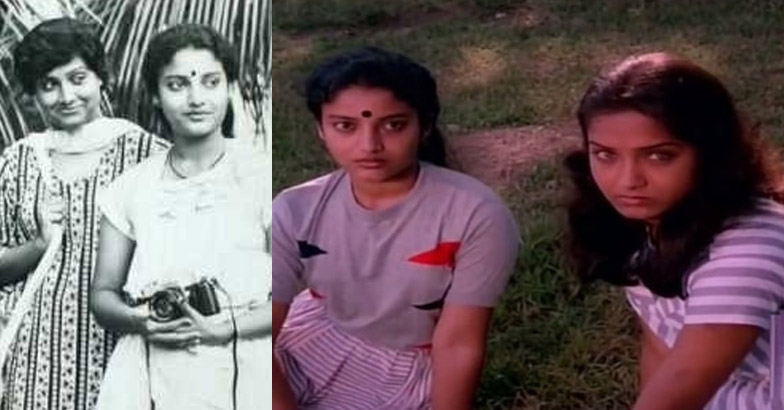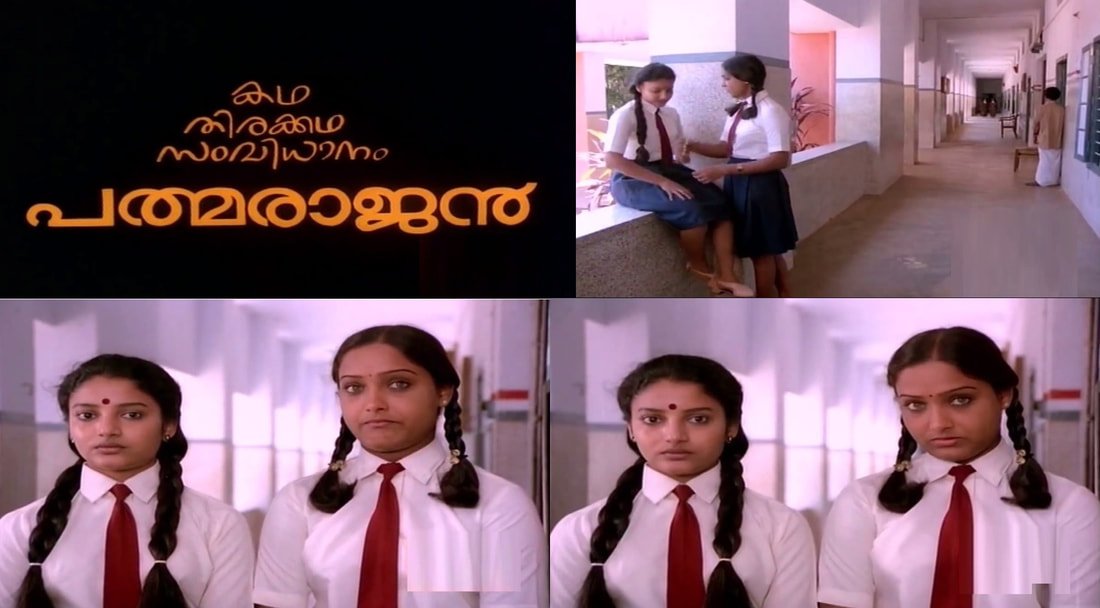Padmarajan, the iconic film maker from Kerala is known for his cinematic aesthetics and exploration of themes which were well ahead of their time. He has directed and written a handful of Malayalam films that have changed the course of film making as a craft and as a means of critical story telling.
Deshadankakili Karayarilla, roughly translated as ‘Migratory Birds Do Not Weep‘, a 1986 Malayalam language film written and directed by Padmarajan is a subtle yet powerful story about teenage life, queer relationships and the complex social and moral stigma around teenage girls.
Deshadankakili Karayarilla talks about two teenage girls Nirmala (played by Karthika) and Sally (played by Shari) who feel unwanted in school and within their families. During their school tour, the duo manage to run away to escape their sense of encasement and live as free birds in the city, on their own.
They meet a stranger named Harishankar (played by Mohanlal) who gets closer to Nirmala, leading her on to believe he has romantic feelings for her. Sally warns her and disapproves of her affection for him. Subtly, it is hinted that Sally was romantically in love with Nirmala, while Nirmala remains unaware of this.
An aspect of the film that must be underlines is how its aesthetics, framing and screenplay does not sensationalise or exoticise homosexual relationships. Most films that represent queer characters even today, resort to sensationalising queer lives, rather than exploring them with an intention to normalise them
Deshadankakili Karayarilla has multiple layers that are interwoven closely so as to depict the greys of human relationships, vulnerabilities and the alienation faced by queer individuals, especially teenagers who often have nobody they can trust or be guided by with respect to their sexual identity.

Image: Old Malayalam Cinema
At a time when homosexual relationships were not even socially acknowledged, leave alone represented on screen, Deshadanakil Karayarilla made a genuine attempt to encapsulate its dynamics. Padmarajan is subtle in his positioning of the probability that Sally has romantic feelings for Nirmala.
His frames and nuanced screenplay leave it open to the discerning viewer to see the undertones of a homosexual identity within the friendship of the girls. Their concern for each other, Sally’s empathy for Nirmala when she is assaulted for misconduct in school and at home, their willingness to share their insecurities – all of it could be read as the consequences of an obsessive friendship, but in retrospect, Deshadanakil Karayarilla packs much more into the narrative.
Also read: Geeli Pucchi: Exploring The Messiness Of Caste And Sexuality
An aspect of the film that must be underlines is how its aesthetics, framing and screenplay does not sensationlise or exoticise homosexual relationships. Most films that represent queer characters even today, resort to sensationalising queer lives, rather than exploring them with an intention to normalise them.
Deshadanakil Karayarilla tries to tell the story with sensitivity and is not voyeuristic in its gaze. It makes the viewer an active participant in the process of engaging with the story, and leaves it upon them to reach their own conclusions wherein the narrative only acts as a facilitator.

While acknowledging the discriminations in store for two teenage girls who choose to live on their own in a male dominant, heteronormative, gender binary society, Deshadanakil Karayarilla does not shy away from showcasing Nirmala and Sally explore the world out there.
They deal with catcallers, find a job, make sure they are not identified by the police, their school and families who have been searching for them – all on their own. Sally’s take on life and responsibilities are a breath of fresh air – not only for her, but also for Nirmala, who was waiting for an opportunity to escape the torture of her drunkard father and an impending, early marriage.
We suffocate young girls with the puritan burden of morality, by repressing their natural curiosities, and use their own bodies as tolls against them. When this predicament is imposed on queer teenagers, their trauma is multiplied. With no guidance or help, they develop feelings of abandonment, the urge to escape and to sometimes end their lives
The entire narrative is about the girls finding their agency in life while fighting a system and society that vehemently tries to tame their minds, bodies and sexualities. Sally is a strong character, determined to find her way through life no matter what. On the other hand, Nirmala too refuses to succumb to the life her father would have imposed on her, despite her emotional vulnerabilities.

By juxtaposing such contrasting characters in a space of friendship and affection, Deshadanakil Karayarilla balances emotional fragility, freedom of choice and female agency. The bond between Nirmala and Sally is powerful and represents the politics of gender, female solidarity and queerness, omnipresent throughout the narrative for the sagacious viewer to decode.
Devika (played by Urvashi) is a teacher who is in charge of the tour during which Nirmala and Sally run away. She is a character that represents the insensitivity and moral rigidity with which teenagers, especially girls are treated in schools. She is sure a victim of her own conditioning, as she comes to realise later on, but the movie rightfully places her character and our education system in critical light.
Padmarajan explores the theme of homosexuality and the ambiguity around it at a time when queerness was socially and morally prosecuted even as a concept. Deshadanakili Karayarilla is one of the first movies in Malayalam cinema to have ventured into the portrayal of female sexuality and lesbianism
We suffocate young girls with the puritan burden of morality, by repressing their natural curiosities, and use their own bodies as tolls against them. When this predicament is imposed on queer teenagers, their trauma is multiplied. With no guidance or help, they develop feelings of abandonment, the urge to escape and to sometimes end their lives.
Deshadanakil Karayarilla addresses all these layers without any kind of in-the-face sensationalism.

Even when Nirmala begins to fall in love with Harishankar, Deshadanakil Karayarilla makes it a point to bring in Sally, to portray the nuances of queer affinities. At various instances, Sally restricts herself from controlling Nirmala, she tries to not disrupt her choice of wanting to be with Hari.
However, the strong solidarity of their relationship thrive as they keep looking for their “safe heaven“, a place where they can just be.
Padmarajan explores the theme of homosexuality and the ambiguity around it at a time when queerness was socially and morally prosecuted even as a concept. Deshadanakili Karayarilla is one of the first movies in Malayalam cinema to have ventured into the portrayal of female sexuality and lesbianism.
Though subtle, the film packs all the complexities of struggling with sexual identity, while being young girls in a conservative, patriarchal society. It was truly ahead of its time, and each viewing of it now brings to surface various subtexts, which underline its relevance even today.
Also read: The Butch/Femme Spectrum In Indian Cinema—Is It Problematic?
Featured Image Source: Old Malayalam Movie Stills
About the author(s)
Anagha is a postgraduate student who is interested in the field of gender studies and sociology. She hopes to make the world a better place for all genders, one step at a time. Being a person who tries to make things better around her, she is in a constant process of learning and unlearning. Reading and gardening are her escape from the daily hustle





Being a Malayali, I was not aware of this film. Will definitely check it out. It’s great that they were willing to explore such a subject years ago.
But really sad that even today there’s a dearth of representation on screen.
Thank you Anagha for such a well articulated review of this movie. I remember watching this movie years ago as a child and not finding it about queerness or homosexuality because at the time it was so nascent a concept, it didn’t even cross my mind. It equally amazes me that you as a writer is able to delve into the layers of this movie, clearly made ahead of its time, with such clarity and depth of understanding of the human condition.